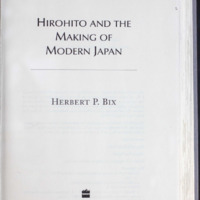-
Title
-
Hirohito and the making of modern Japan
-
Description
-
A biography of the Japanese emperor reveals a powerful man who successfully cultivated an image of a reluctant king while manipulating important events behind the scenes for five decades.
-
Identifier
-
896648
-
006019314X
-
Creator
-
Bix, Herbert P
-
Format
-
1st ed.
-
Source
-
Brian Lamb Booknotes Collection
-
Gift of Brian Lamb, 2011.
-
Catalog record
-
Language
-
eng
-
Date
-
2000
-
Program air date: September 2, 2001
-
Publisher
-
HarperCollinsPublishers
-
George Mason University. Libraries. Special Collections & Archives
-
Text
-
Transcription of Annotations
Notes from front endpapers and half title page: "H. marriage arranged; color blindness; tried to break it up. - What's the history of the monarchy? - Emperor Meiji fathered 15 children by five different women, 11 died. - Could or would a Japanese person write and publish this book in Japan today? - "War of Greater East Asia". - b. April 29, 1901, d. 1989. - What difference with you and John Dower? - Noam Chomsky helpful. - Hirohito: 62 year reign, from 1926-1989. - Fudged his role as military leader and head of state. - He was one of most disingenuous persons to ever occupy modern throne. - What new documents, etc. have been published? - H.'s grandfather Meiji - 1868; H. involved in war planning from 1937 on. - American occupation ended 1952. - What was his modus operandi as Supreme Commander? - Religious, political, military leadership. - He never once admitted guilt for the war of aggression. - Before Hirohito: The Meiji - what was the status of the monarchy? - 8 years of undeclared war with China. - Religion of emperor worship, p. 280. - Shinto mythology. - China War; -mid 1937; Marco Polo Bridge flare-up; Soviet intervention? - Heartless, cruel Japanese image; Americans have not forgotten because of atrocities of POW's, p. 360. - Hirohito - responsible for poison gas." -- Notes on back flyleaf: "Russia, China - Chiang Kai-shek, Britain, France - French Indochina. - Tripartite Pact: Japan, Italy, Germany. - 1941: Hirohito - 44 yrs. old. - 11 year old Akihito - diary entry Sept. 1945 (p. 534) - Hard to believe he wrote it. - End of '52: 250,000 military still in Japan. - What's Article #9 condition? - After '52 constitutional status nothing more than a "Symbol". Japanese political double standard about the lost war. - How often did Japanese media censor itself about monarchy's role in war? - H. dies Jan.7, 1989. - MacArthur and Hirohito, p. 545. - M. had a dark side - extreme egoism and pomposity - unlike H. - The photograph. - Jap. people learned H. worth 16 Bil. a year. - What's a rescript? - A factor of defeat - top command spending so much time keeping H. informed, p. 392. - July 21, 1941: Americans froze Japan's assets and followed with oil embargo. - The Tokyo Trial - 17 years of alleged conspiracies, 1928-1945. - 1) Japan aggression against China; Manchuria incident. - Judge Webb handed down guilty verdicts on all 25 principal defendants, 7 executed by hanging. - What's the "Hull note"?. - 2) Mistreatment and murder of allied prisoners of war. - 3) Mass atrocities at Nanking. - 4) Japanese killing of civilians in Manila, did not pursue indictment of Japanese on chemical warfare. - What were the imperial conferences? - 8 of them 1938-Dec. 1941, p. 328. - Used by Emperor to mislead public into thinking he was passive when military decisions were made: 1) powerless cabinet, 2) emasculated constitution 3) dynamic Emperor involved in all planning for military action.(p. 441) - H. did not visit any theater of war; habitually cautious; a deeply suspicious leader; his stubborn persistence; rigid character; traveled to Shrine to pray; fixated on the Soviet U.; insatiable appetite for Japan and German newsreels; loved entomology - bugs; [?] collected films for H. including Disney cartoons. - Japan destroyed all records of POWs. - Annotations by Brian Lamb in the margins and underlining of pertinent phrases throughout the book. - Examples: p. 196: "Instead of creating intimacy with his subjects in their period of economic suffering, these pseudo-public appearances left him as remote from, and as uncomprehending of their daily lives as ever." - p. 255: "Although the 'empire' had just gobbled up new territory, Japan remained economically dependent on its main critics and rivals, the Anglo-American powers." - p. 336: "It seems unlikely that the Konoe government knew of the rape and pillage at Nanking but the well-briefed Hirohito did not." -p. 409: ""In the event there is no prospect for achieving our demands by about early October, we shall immediately decide to initiate war with the United States (Britain, and The Netherlands)"". - p. 539: "As scenes of military disorder, theft of military stocks, and general unruliness within the armed forces multiplied, civilian respect for the military collapsed." -- p. 611: "The Nuremberg and Tokyo tribunals, having exceeded the framework of international law as it existed before World War I, were illegal." - p. 618: "...Hirohito never lost sight of his larger aims, which were to stave off domestic and foreign pressure for his abdication, to preserve the monarchy, and thus to maintain a realm of stability and a principle of legitimacy in Japanese political life."
-
Subject
-
"Hirohito, Emperor of Japan, 1901-1989."
-
"Emperors--Japan--Biography."
-
Relation
-
Original Booknotes interview
-
Rights
-
This work may be protected by copyright laws and is provided for educational and research purposes only. Any infringing use may be subject to disciplinary action and/or civil or criminal liability as provided by law. If you believe that you are the rights-holder and object to Mason’s use of this image, please contact speccoll@gmu.edu.
 896648.pdf
896648.pdf